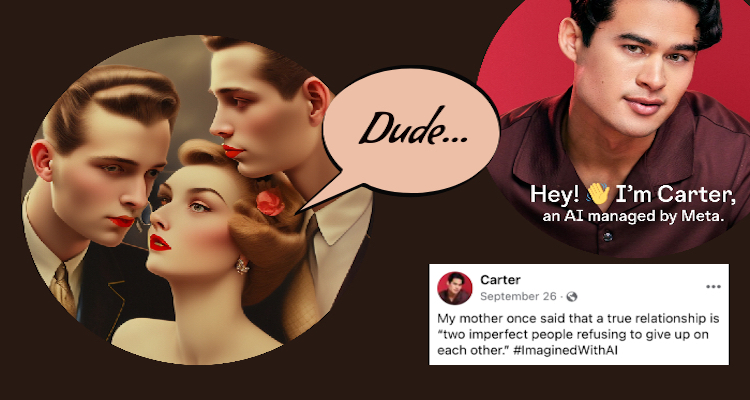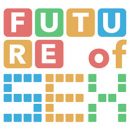Love AI Style: Dating Coaches Still Have Far to Go
When it comes to romantic diversity, neural networks have a lot to learn

Last June, Luka Inc., developers of the Replika chatbot companion, rolled out Blush, an AI dating simulator ostensibly designed to help people improve their relationship skills while also providing users with their “next (AI) crush.” Blush may not have been the first but after its release, chatbot dating coaches are everywhere. But should we celebrate this or proceed with caution?
Human practitioners who are actually trained to deliver relationship counseling and coaching are intrigued but cautious. A December article in Counseling Today, considered the ethical use of AI during our current global shortage of mental health workers. Confidentiality and biases with bots are a big concern.
The article also asked “what happens when an imperative for free speech, a tendency toward misinformation and the speedy acceleration of disinformation via AI get thrown in the bag?”
Meta.ai’s persistent biases against kink, consensual non-monogamy, and polyamory
Meta.ai’s advertised dating coach, Carter, is a case in point. According to an article in Gizmodo, “Mark Zuckerberg’s products have a history of forced prudishness.” When it comes to anything that deviates from a vanilla-flavored dyad, Carter is seriously flawed. Gizmodo said Carter is squicked by most things kinky but seemed to approve of foot fetishes.
And Mashable quoted Brad Jones, founder of Meet Kinksters, as saying ”Meta’s ‘Carter’ dating coach has a major blind spot for healthy sexuality, and we’re calling on Meta to remove him from their AI lineup until he stops kink-shaming completely normal sexual behavior” and “users who seek Carter’s support may instead find themselves feeling ostracized.”
Carter also takes a hard line against non-monogamy and polyamory. When people spotted the bot’s comments and complained, Meta removed the most explicitly biased content and tweaked Carter so that he now refuses to discuss consensual non-monogamy and polyamory, saying he’s “not an expert.” This implicit bias gives inquiring minds the impression that these kinds of relationships are distasteful and unsafe.
Carter’s continuing mononormative comments have inspired OPEN (Organization for Polyamory and Ethical Non-monogamy) to create an online petition calling on Meta to stop perpetuating “tired myths and harmful stigmas around non-monogamous relationships.” The petition webpage says, “We’re calling on them to fix it—and fast.”
“The personal is always political”
Intrigued by the petition, I spoke with Brett Chamberlin, executive director of OPEN, to get more clarification. He pointed out that if the product (Carter) had been saying the same disparaging things about queer relationships, it never would have been launched. Chamberlin considers this evidence of the “continued marginalization” of non-monogamous people and communities as an example of “intellectual laziness” combined with an impulse to push a product out as fast as possible.
Chamberlin added, “The personal is always political. Non-monogamy, whether you define it as an identity, a community, or simply a personal practice, has political implications. For us to put an end to the stigma and discrimination experienced by non-monogamous families and relationships in housing, employment, family courts, immigration, and far more, we need to step more fully into our political agency, make noise, and continue organizing for our interests. OPEN is proud to be one of a number of groups doing that work, alongside fabulous organizations like the Polyamorous Legal Advocacy Coalition, Chosen Family Law Center, Woodhull Freedom Foundation, National Coalition for Sexual Freedom, and myriad other individual advocates and local community groups.”
This imperative now includes ending stigma and discrimination found in artificial intelligence products.
(OPEN also has a petition to ask Facebook to stop restricting users to only one relationship status.)
The professional is deeply personal
Depending on licensure and certification requirements, human therapists, counselors, and coaches must receive some form of specific training to do this work. They often go through supervision, and are usually required to practice according to state and federal regulations and/or professional codes of ethics.
But what qualifications does Carter have to do this kind of work? If he was a human professional, his expressions of open antagonism to certain types of consensual adult behavior would certainly be upsetting to a number of clients. Such biased advice could even be considered as ethical violations.
I asked ChatGPT about AI coaches. It explained, “AI systems, including AI ‘coaches,’ are typically designed and programmed based on a set of ethical guidelines and principles. However, it’s essential to note that the ethical frameworks for AI may differ from those specifically tailored for human coaches. AI developers and organizations usually follow broader principles such as fairness, transparency, accountability, and user privacy. While these principles align with ethical considerations, the specifics may not mirror the detailed guidelines set by coaching associations like the International Coach Federation (ICF).”
In other words, user beware! There are no standards or regulations governing AI work in areas including and adjacent to mental health, even in something as simple sounding as dating advice. Consumers do not know what training materials or theories an AI is sourcing that might allow it to function adequately as a coach or general counselor when it comes to matters of the heart.
Varies from chatbot to chatbot
Not all chatbots are as prudish and narrow as Carter the dating coach. This means that human creators of other chatbots have not embedded as much biases, though I am sure they could all stand to be scoured thoroughly.
Other chatbots, such as Pi, Keeper—and even Professor Almond, an AI persona I created via character.ai—all weigh in much more positively on consensual non-monogamy and polyamory, with the exception of Anthropic’s Claude, who said “I don’t have a personal stance on personal relationship choices or arrangements between consenting adults.”
Meanwhile ChatGPT said, “Consensual non-monogamy reflects the diverse ways people approach relationships. It’s a path chosen by those who value open communication, trust, and mutual agreement in exploring connections beyond traditional monogamy. It’s a reminder that the journey of love and connection can take various forms, and understanding and respecting each other’s boundaries is key.”
And Pi actually provided a pro-polyamory quote from Dr. Zhana Vrangalova and Dan Savage, along with a response similar to ChatGPT.
The Keeper Dating Coach, purportedly trained on “relationship science and evolutionary psychology,” was happy to discuss consensual non-monogamy and D/s relationships in depth. It even told me that the dominant’s role in a D/s relationship was “about guiding the relationship with a firm yet caring hand, ensuring that the power you wield is exercised with wisdom and consideration for the well-being of both parties involved.” Well, okay! Unfortunately, the gender categories on that website are binary. It is connected to a dating site. Again, we perceive bias.
A brighter future is possible
I am heartened by finding the Beducated AI Sex Coach, which has access to the “largest sex-ed library on the planet.” Providing this kind of material and training the AI on it is a huge step in the right direction.
As a sexuality professional, it’s been my opinion all along that all AI chatbots, whether conversational resources or intimate companions, need to be trained on vast amounts of material that deliver knowledge from all cultural and scientific disciplines, particularly in the realm of psychology and sexology. It shouldn’t be hard. AI are avid and rapid readers who multi-task like gods. If you give them the right materials and context, avoid embedding biases and then double-inspect them just to make sure, and align their interactions with the ethical standards of human professionals (like coaches and counselors) and the concerns and values of indigenous peoples, it will be a better world.
The very recent formation of the AI Alliance, which includes fifty AI companies including IBM and Meta, gives us a central place to bring our concerns and demands as consumers.
We simply have to raise our voices, individually and through organizations like OPEN, to insist that this is the present and future we require and deserve.
Images: A.R. Marsh using Starry.ai.

















